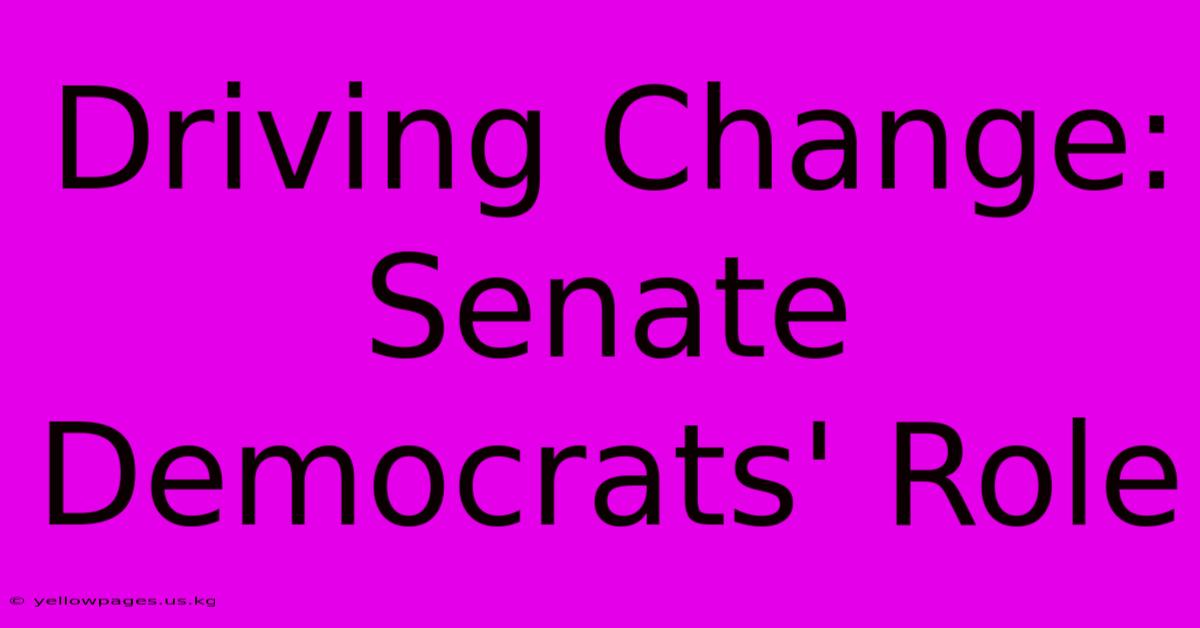Driving Change: Senate Democrats' Role

Discover more detailed and exciting information on our website. Click the link below to start your adventure: Visit Best Website trendingnews.us.kg. Don't miss out!
Table of Contents
Driving Change: Senate Democrats' Role in Shaping Modern American Policy
The United States Senate, a body often characterized by gridlock and partisan divides, has nonetheless witnessed periods of significant legislative action driven by the Democratic party. Understanding the Senate Democrats' role in shaping modern American policy requires examining their legislative successes, their challenges, and the evolving political landscape in which they operate.
Legislative Wins and Policy Impacts
Senate Democrats have championed numerous landmark pieces of legislation impacting various facets of American life. Their influence is readily apparent in several key areas:
1. Healthcare Reform: The Affordable Care Act (ACA)
Arguably the most significant achievement of the Obama era, the Affordable Care Act stands as a testament to the Democrats' ability to push through transformative legislation. While fiercely contested, the ACA expanded health insurance coverage to millions of previously uninsured Americans, implementing key provisions like the individual mandate and expanding Medicaid eligibility. This legislation continues to shape the national healthcare debate and remains a cornerstone of the Democratic platform. The long-term impacts of the ACA, including its successes and limitations, are still being studied and debated.
2. Economic Stimulus and Recovery: The American Recovery and Reinvestment Act of 2009
In response to the Great Recession, the American Recovery and Reinvestment Act (ARRA) represented a massive government intervention aimed at stimulating the economy and creating jobs. This stimulus package, largely spearheaded by Senate Democrats, included tax cuts, infrastructure spending, and aid to states and local governments. The effectiveness of ARRA remains a subject of ongoing economic analysis, with differing perspectives on its contribution to the recovery.
3. Climate Change Initiatives: The Inflation Reduction Act
More recently, the Inflation Reduction Act (IRA) signifies a major step forward in addressing climate change. This bipartisan legislation includes significant investments in renewable energy, tax credits for electric vehicles, and measures aimed at reducing greenhouse gas emissions. The IRA represents a notable legislative victory for Senate Democrats, demonstrating their capacity to navigate complex negotiations and secure bipartisan support on a crucial issue. However, the long-term effectiveness of the IRA in combating climate change depends on several factors, including future technological advancements and global cooperation.
Challenges and Obstacles Faced by Senate Democrats
Despite these legislative victories, Senate Democrats regularly encounter significant hurdles:
1. Filibuster Rules: A Major Impediment
The Senate's filibuster rule, allowing a minority of senators to block legislation, presents a considerable challenge. This procedural hurdle has repeatedly frustrated Democratic efforts to pass legislation on issues such as voting rights and gun control, requiring supermajorities that are often difficult, if not impossible, to achieve. Reforming or eliminating the filibuster remains a contentious issue within the Democratic party itself.
2. Partisan Polarization: Increased Gridlock
The increasing partisan polarization in American politics exacerbates the challenges faced by Senate Democrats. The deeply entrenched ideological divisions make bipartisan cooperation increasingly difficult, often leading to legislative gridlock and hindering the passage of even moderately progressive legislation. Overcoming this polarization requires a significant shift in the political climate and a renewed emphasis on finding common ground.
3. Evolving Political Landscape: Shifting Public Opinion
Public opinion shifts and evolving political priorities also present challenges. What might be popular at one point in time can become controversial later, forcing Democrats to adapt their strategies and prioritize legislation based on current public sentiment. This necessitates careful analysis of public opinion trends and a flexible legislative approach.
Conclusion: The Ongoing Struggle for Progress
The Senate Democrats' role in shaping modern American policy is a complex and multifaceted one. While they have achieved significant legislative victories, they face substantial challenges in navigating the complexities of the Senate, overcoming partisan gridlock, and adapting to an evolving political landscape. Their continued efforts to drive change will be crucial in determining the future direction of American policy. The ongoing debate over crucial issues like healthcare, climate change, and economic inequality underscores the importance of their continued engagement and their capacity to find common ground and build broad-based coalitions to affect meaningful change.

Thank you for visiting our website wich cover about Driving Change: Senate Democrats' Role. We hope the information provided has been useful to you. Feel free to contact us if you have any questions or need further assistance. See you next time and dont miss to bookmark.
Featured Posts
-
College Bowl Games Full Schedule
Jan 01, 2025
-
Democrats Impact Building Opportunity
Jan 01, 2025
-
2025 Nhl Winter Classic Date And How To Watch
Jan 01, 2025
-
College Football Playoff Updated Quarters
Jan 01, 2025
-
Updated Lsu Depth Chart Texas Bowl Opt Outs
Jan 01, 2025
